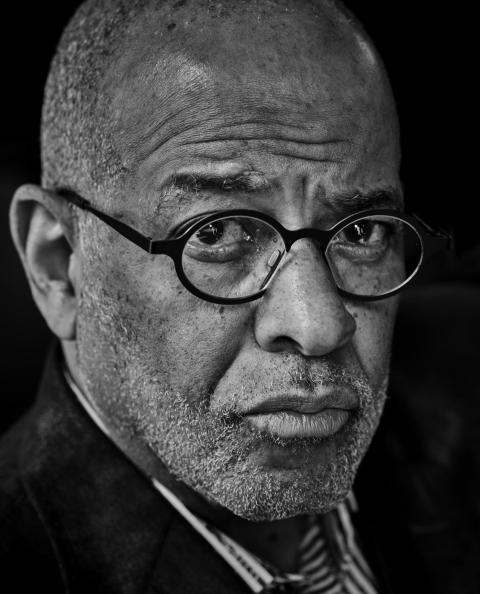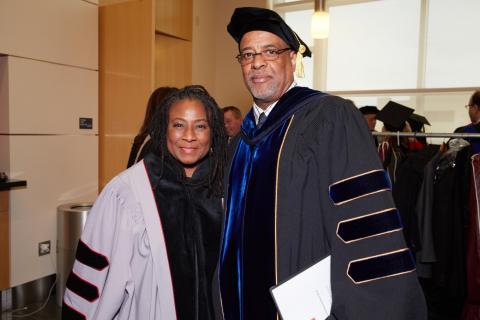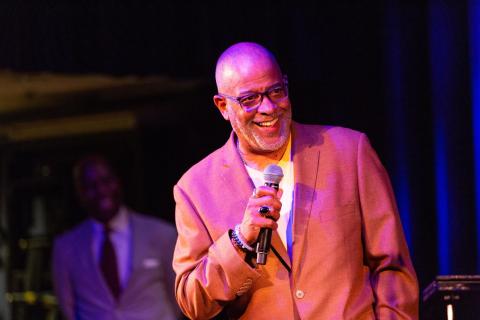A Lifetime of Leadership

Larry Simpson
Image by John Huet
Larry Simpson’s leadership qualities were evident from the moment I met him. But it wasn’t about bombastic personality, commanding presence, or an ability to manipulate people and places. With Larry it’s always been about his uniquely cerebral leadership qualities, his ability to bring reason to a situation that to some might appear out of control.
Though his intellect earned him a doctorate, he never chose to wield his wisdom through some sense of entitlement. Berklee is a better place than it was when his tenure began there, but the Larry Simpson we know would hardly stand around awaiting hosannas for having been a positive change agent. Likely his accomplishments at Berklee will be recognized in a manner befitting the kind of quiet dignity he always brought to his leadership.
Larry and I go back to our matriculation at Kent State University in the late ’60s and early ’70s. Our time at KSU was one of great world upheaval, fueled in part by righteous student activism and recognition of the many ills and inequities we faced in our world. And positive change is what Larry and our group of student leaders all sought.
Some have viewed that great period of KSU student unrest through the convenient prism of the tragedy of May 4, 1970, when the Ohio Army National Guard opened fire on a group of students it perceived as a threat. That action led to the historic deaths of four students, forever immortalized by the classic Neil Young song “Ohio” for Crosby, Stills, Nash & Young.

Larry Simpson with Geri Allen '14H at Berklee's 2014 commencement ceremony.
Image by Kelly Davidson
The KSU Black student movement had actually coalesced in November 1968, when the overwhelming majority of Kent’s Black students symbolically walked off campus for a week in a highly organized protest. Larry was among our student leadership cadre during those momentous times.
Fast-forward nearly 10 years later, when we brought together jazz enthusiasts roiled by the lack of jazz recognition and the concurrent scarcity of jazz venues and performances in our Cleveland community. A group of us founded the Northeast Ohio Jazz Society, and Larry eagerly joined our leadership.
As a direct result of that community jazz activism, in 1980 Larry and I joined the committee that founded Cleveland’s thriving annual jazz festival, Tri-C JazzFest. At the time, Larry was ensconced in Cuyahoga Community College’s (Tri-C) administration, eventually ascending to provost positions at Tri-C’s Metropolitan and Eastern campuses.
Larry’s arts portfolio continued to broaden. He subsequently served on numerous arts funding and policy panels, from the Ohio Arts Council to the National Endowment for the Arts to private foundations such as the Doris Duke Charitable Foundation. Then came a series of terms on various boards, including the Musical Arts Association (parent of the renowned Cleveland Orchestra), the National Black Arts Festival, Arts Midwest, and the Association of Performing Arts Professionals, where he served as board chair.
In 2005, Larry was presented the irresistible opportunity to combine his leadership and education experiences with his arts activism when he was appointed to Berklee’s administrative team. Here was an opportunity to exercise his considerable leadership and scholastic acumen in service to a college that annually responds in a very robust manner to questions of “Who’s next?” in contemporary music.

What excited Larry about Berklee? “It was the promise of change that initially excited me,” he recalled in our interview. “I knew I had one more good administrative leadership run in me and I also knew that I did not want to end my career in Cleveland. However, I was a wee bit skeptical about coming to Boston given its reputation among many in the broader African American community,” he cautioned. “But the lure of Berklee and the people who were here and the fact that it was founded on jazz and the music of the African cultural diaspora proved to be a compelling choice. I had no idea in 2005 that both Berklee and Boston would have been so wonderful,” he enthused.
On the occasion of his retirement, warm recollection of memorable aspects of his Berklee experience enhanced our exchange. “My favorite day of the year is graduation day,” he recounted. “It is, to me, a day of achievement and celebration for our students and it is filled with such energy and love.” He went on to cite rewarding commencement encounters, including with Aretha Franklin ’06H, Lionel Ritchie ’17H, Lucinda Williams ’17H, Missy Elliott ’19H, and Justin Timberlake ’19H. “Hearing our students perform the music of these and other degree recipients still rings in my ears!”
As a fellow jazzhead, I was particularly interested in his recall of a memorable encounter at the home of one of the music’s true innovators. “Early on in my tenure, I had the opportunity to go to New York and visit with Ornette Coleman ’06H, the iconoclastic composer and alto saxophonist who helped change the direction of jazz. The purpose was to encourage him to visit Berklee. I did my best to follow the curves and twists of his conversation and storytelling,” he recalls of a man whose deep pronouncements often took more than a minute to fully grasp. “He was a most gracious host and he did come to Berklee in January 2006 for our Berklee Teachers on Teaching program.”
Asked to recount some of his most fulfilling Berklee achievements, Simpson proudly pointed to the Berklee Global Jazz Institute, under the artistic direction of Danilo Pérez. He courted Danilo for the position at the pianist- composer’s annual Panama Jazz Festival. “There was a lot of back and forth, but in the end he agreed and has since built one of the finest jazz programs in the world.”
The indomitable NEA Jazz Master and drummer Terri Lyne Carrington’s pioneering work at Berklee is yet another point of pride. “Terri developed the Berklee Institute of Jazz and Gender Justice after having secured significant financial support. It was a beautiful experience to stand in the backyard of former Berklee president Roger Brown’s home and be in the presence of Angela Davis, Gina Dent, Elizabeth Alexander, and others profoundly articulating the need for such an institute,” Simpson enthusiastically recalled.
Places inevitably elicit warm memories in Larry Simpson’s recollections of his Berklee tenure. “I have had the opportunity to visit many countries in the world, including standing in the squares… Red, and Tiananmen. I have heard music at the Great Wall of China that absolutely astounded me with its diversity and richness. Meeting the president of Gabon in West Africa. Sitting on the seawall of the Malecón in Havana, Cuba… But of all of these memorable experiences by far the best are those everyday experiences of hearing our students perform on our stages and when I hear them working things out in private lessons. And finally, I dearly love traversing up and down Boylston Street or Mass. Ave. and having surprise encounters with our faculty, students, staff, and those surprising guests I didn’t even know were in town!”
As his retirement arrives, what’s next for Dr. Larry Simpson? “Ideally in retirement I will remain healthy, consistently shoot my age in golf; spend more time with family; have dawns and sunsets find me in various and sundry places capturing amazing moments with my Nikon Z6 mirrorless camera; reading and writing poetry that beguiles the brain with beauty and questions for which there are no answers, all the while remaining balanced and at peace,” says the man I’ve had the pleasure of calling friend and brother for over 50 years! Berklee, clearly it has certainly been his—and your—pleasure.
Willard Jenkins is the author of African Rhythms and the forthcoming book Ain't But a Few of Us. He serves as the artistic director of the D.C. Jazz Festival.
This article appeared in the spring/summer 2022 issue of Berklee Today.
